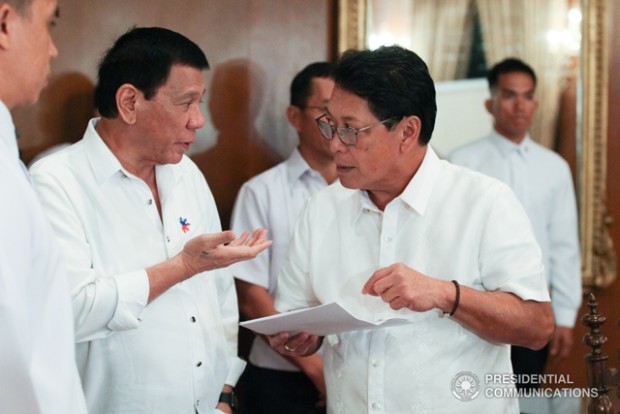
President Rodrigo Duterte and Labor Secretary Silvestre Bello III (FILE Photo from the Presidential Communications Operations Office)
The government will not declare a unilateral ceasefire ahead of the resumption of peace talks with communist rebels next week, peace panel chair Silvestre Bello III said.
Bello said what President Rodrigo Dutere wants is a bilateral ceasefire agreement that has a greater chance of leading to the silencing of guns between the two warring sides.
“Right now, there is no reason to declare a unilateral ceasefire because our President is more interested in obtaining a bilateral ceasefire agreement,” Bello told a press briefing in Malacañang.
“He only has one marching order: get me a ceasefire agreement,” he added.
With no ceasefire in place, military operations will be normal, he said.
“They have to do their work as protectors of our people, maintain peace and order, everything will be like that. There would be no activities beyond that,” he said.
Since the government won’t declare a unilateral ceasefire, he does not see the communist rebels pushing through with their earlier plan to declare their own ceasefire.
The Communist Party of the Philippines had planned to declare a unilateral ceasefire no later than Friday and had expected the government to do the same.
But Bello does not consider the absence of a government ceasefire as an obstacle to the negotiations, which he said would focus on forging a mutual deal with the communists to silence their arms.
“I think we should concentrate more on this more important agreement because this is where we will be assured of the lowering or ending of hostilities,” he added.
The goal is to come up with the bilateral ceasefire agreement during the talks in the Netherlands next week, which would have to hurdle the contentious issues of buffer zones and the communist rebels’ collection of revolutionary taxes, he said.
Another key component to the success of the deal is the choice of the referee.
The government had been under the impression that the Norwegian government would be the third party facilitator, but it was now reluctant to take on the role because of its experience as referee for the peace process between the Colombian government and the FARC rebels, said Bello.
For the Philippine peace talks, he said Switzerland, Canada, Australia and other countries he did not name were willing to take on the role as third party facilitator, he said.
Bello also said the President’s earlier demand for the communist rebels to release their hostages and stop collecting revolutionary taxes were not conditions, but just possible terms in the bilateral ceasefire agreement.
“The President is aware that in these talks, we are governed by the Hague Joint Declaration,” he added.